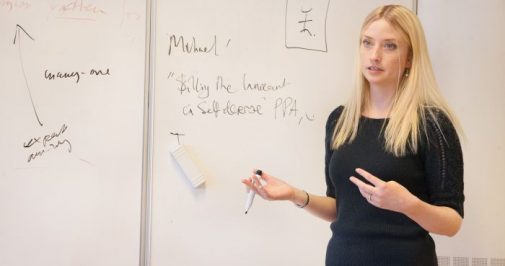Talk Examines Just Killing, Trolley Problem
By
Westmont

Helen Frowe, Wallenberg Academy research fellow at Stockholm University, reflects on ethical warfare and killing in a lecture, “Are We Required to Turn the Trolley?” on Tuesday, April 14, at 3:30 p.m. in Hieronymus Lounge at Westmont’s Kerrwood Hall. The talk, co-sponsored by the Gaede Institute for the Liberal Arts and the Westmont Department of Philosophy, is free and open to the public.
The trolley problem is a thought experiment invented by Oxford philosopher Philippa Foot in 1967 that asks if you would pull a switch to send a man to his death to save five others on a runaway trolley.
Most versions of just war theory hold that just conduct in war requires noncombatant immunity, the idea that civilians must not be intentionally targeted for killing. “But when are we morally responsible for the deaths we cause?” asks Mark Nelson, Monroe professor of philosophy at Westmont. “This is the question illuminated by the famous trolley problem.”
Frowe, who directs the Stockholm Center for the Ethics of War and Peace at Stockholm University, researches the ethics of war and defensive killing. She is especially interested in the moral status of non-combatants and the permissibility of killing innocent people in self-defense.
She earned a doctorate at the University of Reading and was senior lecturer in philosophy at the University of Kent, Leverhulme Early Career Fellow at the University of Sheffield and a visiting fellow at the Harvard Philosophy Department.
Frowe’s talk defends what she calls the Requirement Thesis, which holds that one is required to act in accordance with lesser-evil justifications for infringing a person’s right not to be harmed. “This claim contrasts with the standard view, the Permissibility Thesis, that acting in accordance with such justifications is, at least sometimes, merely permissible, and thus failing to act in accordance with such justifications is also permissible,” she says.
Filed under
Academics, Campus Events, Faculty and Staff, Lectures, Press Releases